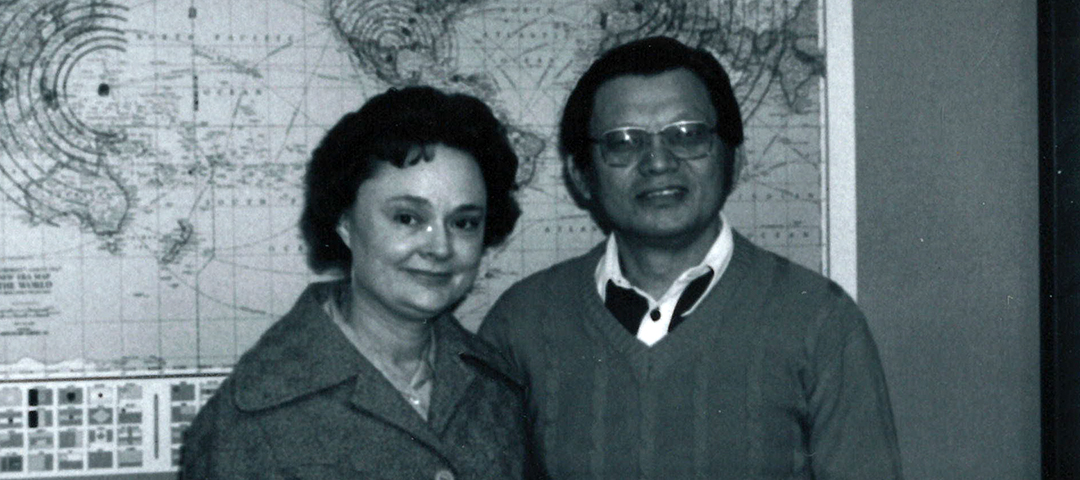
Equipped to Serve
April 18, 2023
Pioneering the Work and Raising Up Leaders
May 2, 2023By Holly Meriweather
“The influence of these two lives for God will live on. Their work in far-off Formosa (Taiwan) will never be finished. Not only did they give their hearts to the cause of foreign missions, but they gave their very lives on the field itself.They have been the means for reaching the lost for Christ. Only time will tell and eternity will reveal how many people are saved as a result of their witnessing.”
John W. Duggar penned these words in his biography of Jack and LaTrell Bateman, pioneer missionaries for NABA, former name of the BMA. They arrived on the field just after a devastating world war that changed the lives of millions.
Jack, a Chinese-American, was a prisoner of that war.
Their Story
Because his deceased father was American, Jack and his siblings were able to leave on a boat headed for the States with no idea if or when they would see their mother again. But they never made it. Along with missionary John Blaylock, their escort, they were captured by the Japanese and sent to a POW camp for three years. Their rescue by American paratroopers came just two days before Japanese soldiers were to implement a mass killing of all prisoners on the island of Manila.
Jack and his siblings were sent to live with the Blaylocks, who helped continue their education, took them to church, and shared the gospel with them. Several years after their rescue and Jack’s salvation, he met LaTrell Johnson.
LaTrell was a high school student who had surrendered her life to overseas ministry to Chinese as a single woman. They met at a Bible conference in Texas just before Jack was diagnosed with tuberculosis. The two had corresponded during his year-long illness as Jack helped LaTrell learn Chinese, and after many marriage proposals, she finally agreed. They were married in 1950, and three years later, with a young son and one on the way, they arrived in Taipei,Taiwan.
Their Ministry
Two months after the Batemans’ arrival, LaTtrell wrote, “Please pray for us that the Lord will show us HOW to start a work. We have never felt so stupid and helpless. We are the youngest missionaries here.” Assessment, training, and deputation were not required at the time, so they instinctively began building a community of believers that included language teachers, military families, staff members of the Political College, and hospital personnel. These early relationships continued for many decades.
An island of mostly mountains, Taiwan in the 1950s had three diverse people groups: those who fled China to escape communism, native mountain people living in villages, and original inhabitants occupied by Japan from 1937-1941. Buddhism, a shame- and fear-based religion of ancestor worship caused its followers to live in constant fear of everything. Very few had ever heard of Jesus.
Jack and LaTrell felt a heavy burden for the people of Taiwan. He said, “Seeing these people in their lost condition, my heart goes out to them. You can see them with a small cart of big logs, straining every muscle, with the load of sin which only Christ can lift. Where is the future of these people except in our Savior? Unprepared for this task, I feel inadequate and helpless, but there is consolation in the Lord who can do all things when human strength fails.”
Teaching English using the Bible as their “textbook” was an effective ministry tool that both the Batemans used. Some of their early ministries included Vacation Bible Schools, youth group meetings, children’s church, and a young singles class. Jack was asked to teach at the Political College, a research university in Taipei, that allowed him to reach students with the gospel.
Another effective initiative was English Camp. The Chinese were (and still are) very dedicated to education, so the Batemans allowed young people to study in the church basement for their very rigorous exams. Later, Jack began a summer camp with conversational English and Bible seminars that helped with students’ difficult exams.
These intentional efforts, and others such as women’s auxiliary meetings, summer revivals, and Saturday night youth fellowships, helped begin a mission church in their home in 1954, twenty-two months after their arrival in Taiwan. Attendance, or the lack of it, was always an issue, but their little church slowly outgrew the Bateman home.
In 1956 the Shin Sheng Gospel Baptist Church was established, but Jack believed that “a church is not mature until it starts a new mission.” So he immediately discipled new converts, teaching them about baptism then church ministry and leadership to equip new leaders and ministry workers. In the following decades, other missionary families established work in Taiwan, an answer to prayer for the Batemans who had prayed for others to join them in reaching the people group for whom they felt such a burden.
As the Taiwan work grew and new missionaries joined the Batemans in and around Taiwan, other churches were planted, like the Nan Chi Chang, Da Jur, Yung Shing, Hsin Seng, and Chun Luan churches, which are still thriving. Perhaps Jack’s greatest legacy was his role in the multiplication of churches all over the globe. As young Taiwanese who had been discipled left their homeland, mission churches were established and the gospel was shared.The Batemans left the field in 1990 and retired to Arlington, Texas, 37 years after arriving in Taiwan. But retirement did not mean an end to ministry. They began serving in a Chinese church in Arlington, Texas, until Spring Creek Baptist Church in Plano began a Chinese ministry in their building and the Batemans served the congregation. LaTrell died in 2015, and Jack in 2021, but their legacy lives on. Their letters to the Gleaner always mentioned the desperate need for more ministry workers to lead Taiwanese out of the darkness of Buddhism.

